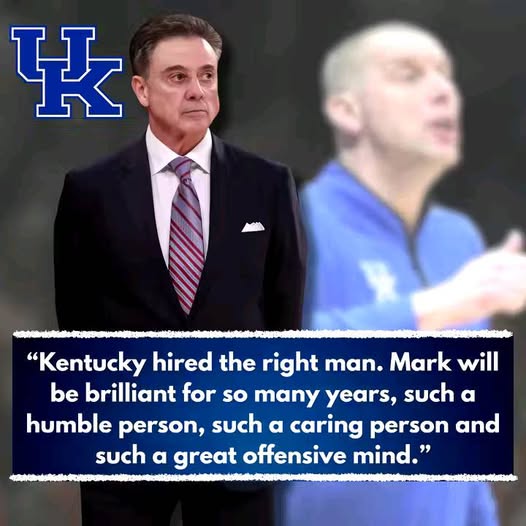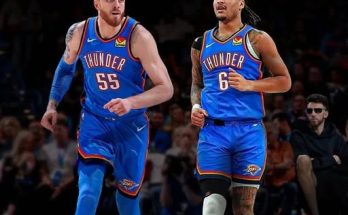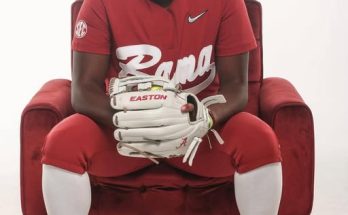When Mark Pope returned to Lexington as the new head coach of the Kentucky Wildcats, expectations soared as quickly as questions emerged. The former Kentucky captain from the 1996 national championship team took the reins of one of college basketball’s most storied programs in 2024, succeeding John Calipari and ushering in a new era defined by familiarity, energy, and a deep-rooted love for Big Blue Nation.
And after a rollercoaster of a debut season filled with both flashes of brilliance and the growing pains of transition, one of the most influential voices in college basketball history weighed in — and his words carried serious weight.
Hall of Fame coach Rick Pitino, who coached Pope during his playing days at Kentucky, offered a glowing endorsement of the new head man in Lexington.
“Mark Pope was born to coach this program,” Pitino said during a recent appearance on ESPN Radio. “What he did in his first year — given all the pressure, all the expectation — was truly remarkable. The way he connected with the players, energized the fanbase, and brought pride back to Kentucky basketball, I couldn’t be prouder of him.”
A Familiar Voice Offering Validation
Pitino’s praise doesn’t come lightly. As a coaching legend who led Kentucky from NCAA sanctions to national prominence in the 1990s, culminating in the 1996 championship — with Pope playing a pivotal role — Pitino knows intimately what it takes to succeed at a blueblood program.
“Mark was the kind of player who always thought three steps ahead,” Pitino reflected. “It didn’t surprise me that he went into coaching. What he’s done over his career — at Utah Valley, at BYU — and now what he’s starting at Kentucky, it’s the culmination of years of building his own philosophy. And he’s doing it his way, which I respect.”
Pitino pointed out how Pope’s basketball mind has always been sharp, but what impresses him most now is how Pope has grown as a leader and communicator.
“He’s not trying to be the next Calipari. He’s being Mark Pope — a guy who loves the game, loves Kentucky, and knows how to teach winning basketball.”
A Season of Transition, Promise, and Foundation
Pope’s first season in Lexington was far from perfect, but few expected it to be. Taking over a roster in flux, trying to implement a new system, and handling the immense media scrutiny of the Kentucky job would challenge even the most seasoned coaches.
Still, Pope guided the Wildcats to a solid 22–11 record, a Top 25 finish, and a second-round appearance in the NCAA Tournament — a result many would have taken given the circumstances. He also restored a sense of offensive fluidity and commitment to unselfish basketball that thrilled fans.
From Pitino’s vantage point, those weren’t small accomplishments.
“Kentucky fans are passionate. That’s what makes the job so special. But it also makes it hard,” Pitino said. “Mark embraced that pressure. He didn’t run from it. You could see his fingerprints all over that team.”
The Wildcats played with pace, spacing, and intensity — trademarks of Pope’s BYU squads. They moved the ball well, often ranked among the top teams in assist-to-turnover ratio, and developed young talent throughout the year.
Pitino was particularly effusive about Pope’s ability to maximize players that many overlooked.
“He didn’t just rely on five-star recruits. He coached. He developed guys. He got them to buy in,” Pitino said. “You could tell those kids loved playing for him.”
Building Culture Before Building a Dynasty
One of the themes Pitino revisited in his praise of Pope was the importance of culture.
“You can’t win at Kentucky unless you create a culture where players want to compete, want to sacrifice, and want to be a part of something bigger than themselves,” he said. “Mark is already doing that.”
From retaining key assistants who understood the Kentucky brand to rekindling relationships with alumni and former players, Pope made it a point to restore a sense of family within the program. His regular references to the history of Kentucky basketball and tributes to his own time as a Wildcat resonated deeply with fans and recruits alike.
And Pitino took notice.
“He understands what this program means to the state, to the people. And that matters,” Pitino emphasized. “There’s no better ambassador than someone who’s lived it. Mark’s not just coaching at Kentucky. He is Kentucky.”
Lessons From the Past, Vision for the Future
Pope’s coaching roots were forged through years of absorbing different systems. He spent time under coaches like Jeff Bzdelik and Dave Rose, but no influence looms larger than Pitino’s own legacy.
“He absorbed everything back then,” Pitino said. “We ran a press-heavy, disciplined system, and Mark was the guy always asking questions, always wanting to learn. You knew he was preparing for something bigger.”
Those early lessons have evolved into a modern, analytically-driven style — a fusion of old-school values and new-school adaptability. Pope’s emphasis on three-point shooting, pace, and smart decision-making aligned perfectly with today’s game, and that blend impressed Pitino most.
“He’s taken what he learned and put his own stamp on it,” Pitino said. “That’s the sign of a great coach — someone who honors where they came from but isn’t afraid to innovate.”
Navigating the Recruiting Landscape
Recruiting at Kentucky is a high-stakes endeavor. Pope, stepping into the shoes of Calipari — a recruiting titan — had to prove he could attract elite talent while also finding program fits.
In Year 1, Pope landed several top transfers and built solid relationships with 2025 and 2026 prospects, already making inroads with key five-star targets.
Pitino believes Pope’s style is perfect for the modern recruiting environment.
“Kids want to play for someone who’s genuine. That’s Mark,” Pitino said. “They see a guy who isn’t selling them on flash. He’s offering substance.”
Indeed, Pope’s reputation as a player’s coach — someone who values development and transparency — has helped Kentucky quickly pivot to a model that combines elite recruiting with high-character culture fits.
“You’re going to see Kentucky competing for national titles again soon,” Pitino predicted. “Mark Pope will bring them back to that level.”
A Brotherhood That Runs Deep
Pitino and Pope have stayed close through the years. The respect is mutual, and the connection is deeper than basketball.
After Pope was hired, one of his first calls was to Pitino.
“He told me, ‘Coach, I just want to make you proud,’” Pitino recalled, his voice softening. “And I told him, ‘You already have.’”
That sentiment is echoed by other former Wildcats who played under Pitino and alongside Pope. The tight-knit fraternity of Kentucky basketball royalty is standing firmly behind their new head coach.
Former teammates have praised Pope’s leadership and sincerity. Several former players have even returned to practice and events — something that had become more infrequent in recent years. There’s a renewed sense of pride in the program, and Pitino believes that starts at the top.
Looking Ahead: A Bright Horizon
As Pope begins building toward his second season, expectations will inevitably rise. The recruiting trail is heating up, and the transfer portal is buzzing with possibilities. But Pitino remains confident that Kentucky has found the right man for the job.
“Give him time, and you’ll see championships,” Pitino said. “He’s going to hang banners. He’s going to make the Big Blue Nation proud.”
That confidence, coming from a coach who helped resurrect Kentucky basketball in the 1990s, is powerful affirmation. And it offers a sense of continuity — as if the next chapter of Kentucky hoops is being written with a strong connection to its past.
For Pope, the journey is just beginning. But with Pitino’s blessing, a loyal fanbase behind him, and a locker room full of players buying in, the foundation has been laid.
“It’s about more than just winning,” Pitino concluded. “It’s about doing things the right way. And that’s what Mark Pope is doing.”
Final Thoughts: Legacy in Motion
Mark Pope didn’t return to Lexington to chase someone else’s legacy. He returned to create his own — one grounded in his love for the program, shaped by mentors like Pitino, and driven by a desire to elevate Kentucky basketball in a modern era.
Rick Pitino’s praise isn’t just sentimentality. It’s a recognition of what Kentucky has in its new head coach — a leader who understands the weight of the jersey, the noise of the arena, and the tradition that looms over every dribble in Rupp Arena.
The first season is in the books. And if Rick Pitino’s words are any indication, it’s just the beginning of something special.



